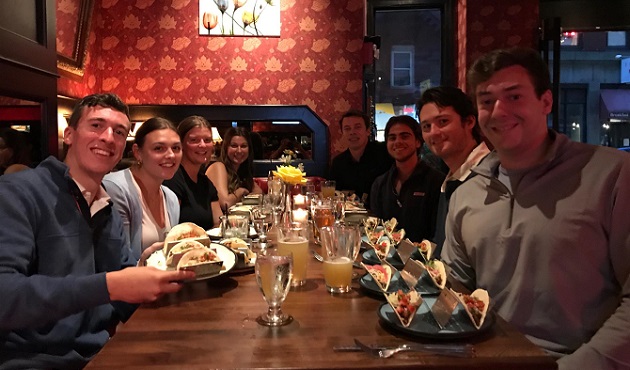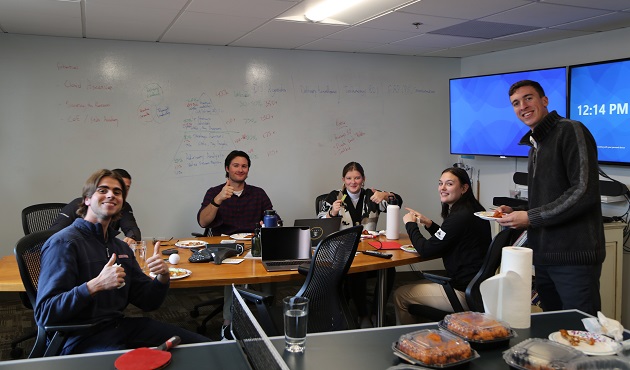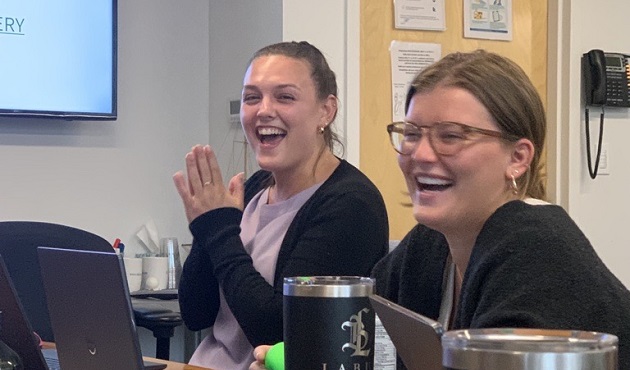People Over Profits
A commitment to relationships solidifies LABUR’s reputation with consultants
In 2008, college friends and coworkers Darrin Lang and Seth Burr quit their secure agency jobs to found Boston-based Labur (named by combining “Lang” and “Burr”). Their vision was to provide IT consultative services and solutions to help companies solve complex challenges — but with a focus on relationships over revenue. “Our mission, why we were in the business, was lifelong relationships with people,” says Lang, who serves as CEO. “We were in an industry where the large majority of firms focused on transactions. We thought, put people first and the rest will follow — one relationship at a time.”
Lang and Burr knew their approach would not lead to instant profit and immediate growth. “It took time to be tried and true to how we were going to do it,” Lang explains. “Not many afford the time and patience and investment to do it the ‘right’ way because it takes longer. But I think that has to be your model. Everything has to speak to that.”
Over time, their approach to putting people over profit has led to consistent growth, Fortune 500 clients, a stellar reputation and a happy and loyal consulting staff — and being a Best Staffing Firm to Temp For winner five years in a row. Mutual Representation
Labur’s commitment to relationships is felt by consultants, clients and employees alike. “They are very good at relationship building,” says Labur consultant Denise Moore. “I feel like I represent them, and they represent me — how can we do that if we don’t have a relationship?” Moore provides senior-level IT delivery and management consulting in Dallas. She joined Labur in early 2020, paused for Covid, and began her first placement in October 2020. Now, she is on a three-year project supporting the merger of two companies by spearheading a large initiative to modernize their applications and move them to the cloud.
Moore has felt the cultural difference at Labur since day one. Compared with other companies, Labur has been more communicative and hands-on. “For example, take the recruitment process,” she says. “I have worked for companies that don’t keep you engaged in the process. You don’t know where you stand, you’re chasing them down to find out what your next engagement is going to be. With Labur, they talk about the next engagement six months ahead of time. By the time you ask what is next for you, they already have a plan.”
Despite working remotely nearly 100%, Moore has not felt isolated. She says of her Labur account manager and office manager, “They recognize the level of work I’m doing, and sometimes it gets intense. They check in nearly every week. To me, the biggest thing is that they are very accessible.” Consultant Mario Calisto agrees. “Labur’s consultants are repeat customers. They stay from job to job. The company gives you a feeling like you’re part of something, even though you are free to roam. Choosing to stay speaks volumes.”
Calisto has been an IT consultant with Labur for five years, in addition to co-leading his own business in Boston. With previous agencies that Calisto contracted with, “I thought, ‘You definitely read my résumé, but you don’t really know me other than what’s on paper.’ But Labur did,” he says.
Culture of Accountability
Labur takes accountability and integrity to heart. Lang explains that it’s their culture of accountability that really propels them. “We talk about that on day one when people come to work here,” he says. Labur employees expect
accountability from themselves, their consultants and even their clients. “We’re not a shop that says the client is always right,” Lang explains. “Labur needs to be held accountable for our piece of the puzzle, consultants need to be accountable for what they sign up for and clients need to come to the table too with their fair share of the bargain, treating us like part of the team.” In fact, Labur is careful to select clients for its portfolio based on shared values and will turn down business if their values don’t align. It’s a difficult choice, but “if you let it be painful in the short run, you’ll get fulfillment for the long run,” Lang says.
Labur leaders are big proponents of hiring for attitude and training for skill. “We love building people from the ground up,” Lang says. They train their consultants and account managers how to treat clients, whether it leads to income or not. “If you train people to take care of people, you give them time and you have a financial model that allows you to sustain it, loyalty builds on itself like you wouldn’t believe.”
Genuine Caring
Labur’s culture of caring extends from employees to clients to the local community. “It feels intimate, small, like a startup,” Calisto says. “Darrin does a great job investing in that. All the main recruiters — I don’t think I’ve seen any turnover. It’s a tight team.”
“I get the sense of a close-knit family culture,” Moore adds. “I see that relationships matter, people matter. Some of the firms I work with, I see that their people are overallocated. I get the feeling that that’s not what Labur is about. I get regular check-ins, asking, ‘Are things okay? Do you need help with anything?’ They care about me as a person.”
Calisto agrees. “They do reviews on a regular cadence with the customer to ask how I’m doing, and also with me to see if it’s working for me,” he relates. “They care that everyone is happy with the setup. It’s very personal.” Meanwhile, nearly all members of the Labur team volunteer with Boston Partners in Education. Lang and Burr both serve as advisory board members to the Red Sox Foundation and Massachusetts General Hospital Home Base Program, which helps Iraq and Afghanistan veterans and their families with clinical care and community education.
Labur’s leaders are honored and grateful to be named a Best Staffing Firm to Temp For by SIA. “There’s not a single person I wouldn’t attribute this to. Awards are a great vehicle to recognize those who deserve to be recognized,” Lang says. “But for clients, it’s the way they’re treated, the consultant who arrives, how we handle diversity. No award can change that.”















